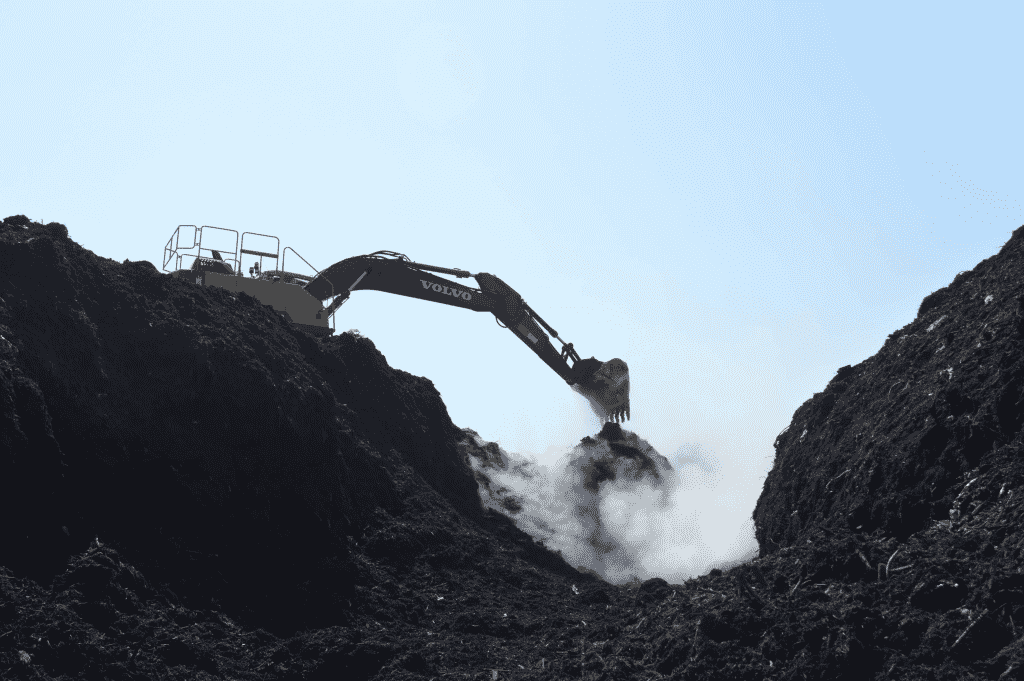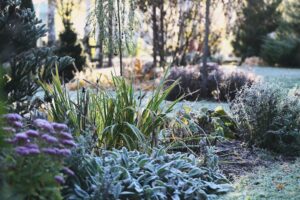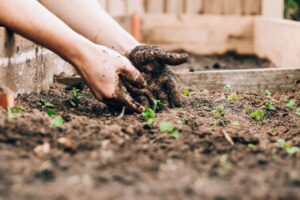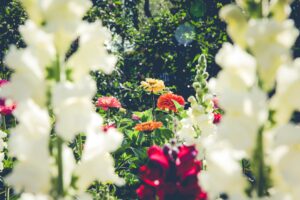
Whether you’re an Earth Cycle customer already or you’re looking to buy some of our compost or topsoil for the first time, it’s likely you’re a serious gardener, looking for a top-quality product. And it also means there is a chance that some of our compost originally came from your garden!
Our soils are derived wholly from organic matter made up of green and garden waste. In fact, each year we divert over 95,000 tonnes of green waste from landfill into our soil and compost processing facilities in Hampshire and West Sussex. We work with local authorities to take their doorstep ‘green bin’ collections and green waste from civic amenity sites to make rich, high-quality, organic and peat-free compost – tens of thousands of tonnes of it every year.
Composting takes around 14 weeks in total, from initial receipt of the green waste to blending and shipping to our customers. At its peak, the heart of the compost stack is almost 80 degrees centigrade – too hot to handle – as nature cleans the soil. From arriving at one of our sites, the soil goes through multiple processes from shedding and screening to turning and grading to create fine, nutrient-rich soil which can then be used to help drainage, support plant growth and fill raised beds. We’re composting on an industrial scale, meaning we need to take in a lot of raw material to keep up with the demand for our products. But not everything that comes in is green!
WHAT IS GARDEN WASTE?
It never ceases to amaze us just what people will put in their green bins. Because they’re marked up as garden bins, some people believe that anything garden-related can go in there. Of course, there’s a certain amount that ends up in there by accident – the odd small trowel or pot for example – and some more common items such as plant labels and compost bags. It’s all in a day’s work for our sorter.
What you may not expect to see in there is garden machinery – surprisingly we’ve seen lawnmowers, hedge cutters and strimmers. We also get a fair amount of garden furniture and even fences. We’re not talking about the occasional item here either. We estimate that the scrap value of all the metal we remove from the waste on entry is more than £10,000 a year – and that’s just the metal. We also screen and remove tonnes of plastic, glass, bricks, cement, hardcore, rope, wire, toys, dolls, plant trays, pots and other garden paraphernalia.
PURE ORGANIC MATERIAL
But don’t worry. We’ve invested in some amazing machinery that ensures the only thing going into our compost heaps is pure, organic material. We even screen the soils for the things you cannot see like chemicals and contaminants such as asbestos and something really hideous called benzopyrene which is a carcinogenic!
When the lorries arrive at our sites, the first step is for the contents to move through our screener. This large, noisy machine is really clever. Within it are a series of conveyors, magnets, sorters and graders that pick out anything that’s not meant to be there. As the waste rolls through the system the machine identifies and spits out – quite literally – anything that’s not supposed to be there into separate piles. And we don’t just screen it once. We will pass the green waste through several times to ensure that whatever hits the heap is pure organic material.
THE COMPOSTING PROCESS
Before we add the screened material to the pile though it goes through a shredder, increasing the surface area and speeding up the composting process. The piles, known as windrows, are then created.
Over the next few months, the rows of organic material will begin to break down, creating those amazing temperatures and killing off seeds and weeds. We then turn the entire heap – thousands of tonnes at a time – to keep the composting process going. The rows of compost on our site are up to 10 metres tall and run for a few hundred metres each. It takes some serious kit to turn that amount of compost! After 12 -14 weeks the compost is ready to start being drawn down to begin the final stage of its production. More screening, sorting and grading take place before we blend it to create the final product. Those blends may include sand, to create our topsoil or cow manure from our organic dairy herd of 250 cows to create our cow compost.
HOW CLEAN IS MY GREEN?
As a society, we’re learning much more about the impact we’re having on our environment. It’s one of the reasons why we take so much care to ensure that what arrives with you in our bulk bags meets the highest standards. Put simply we don’t want to put anything back into the earth that shouldn’t be there.
By processing and screening our soil you can be sure that your plants will have the best possible growing conditions to build strong and healthy root systems that suck up all the positive nutrients they need. You can also be assured that anything you grow to eat is safe, for all the family.
Whilst we have the infrastructure and technology to provide the highest quality, organic, peat-free products, that investment is effectively an insurance policy for you and us. What we’d rather be doing is leading a movement that ensures the only thing going into our green bins is organic material.
So maybe next time you’re in the garden and filling the bin, ask yourself the question of just how clean is my green. Who knows – in a few months’ time, you could just be digging some of that material back into your garden. It’s called an Earth Cycle!



